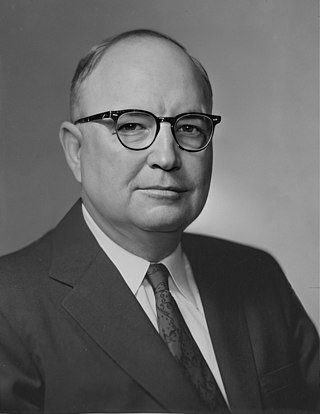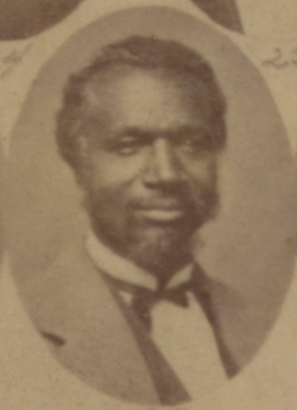
The Fifteenth Amendment to the United States Constitution prohibits the federal government and each state from denying or abridging a citizen's right to vote "on account of race, color, or previous condition of servitude." It was ratified on February 3, 1870, as the third and last of the Reconstruction Amendments.

James Oliver Eastland was an American attorney, plantation owner, and politician from Mississippi. A Democrat, he served in the United States Senate in 1941 and again from 1943 until his resignation on December 27, 1978. Eastland was a leader of Southern resistance against racial integration during the civil rights movement, often speaking of African Americans as "an inferior race." Eastland has been called the "Voice of the White South" and the "Godfather of Mississippi Politics."

Claiborne County is a county located in the U.S. state of Mississippi. As of the 2020 census, the population was 9,135. Its county seat is Port Gibson. The county is named after William Claiborne, the second governor of the Mississippi Territory.

The States' Rights Democratic Party was a short-lived segregationist political party in the United States, active primarily in the South. It arose due to a Southern regional split in opposition to members of the Democratic Party in the North. After President Harry S. Truman, a member of the Democratic Party, ordered integration of the military in 1948 and other actions to address civil rights of African Americans, many Southern white politicians who objected to this course organized themselves as a breakaway faction. They wished to protect the ability of states to maintain racial segregation.

William Thad Cochran was an American attorney and politician who served as a United States Senator for Mississippi from 1978 until his resignation due to health issues in 2018. A Republican, he previously served in the U.S. House of Representatives from 1973 to 1978.
The Radical Republicans were a faction within the Republican Party originating from the party's founding in 1854—some six years before the Civil War—until the Compromise of 1877, which effectively ended Reconstruction. They called themselves "Radicals" because of their goal of immediate, complete, and permanent eradication of slavery in the United States. They were opposed during the war by the Moderate Republicans, and by the Democratic Party. Radicals led efforts after the war to establish civil rights for former slaves and fully implement emancipation. After unsuccessful measures in 1866 resulted in violence against former slaves in the rebel states, Radicals pushed the Fourteenth Amendment for statutory protections through Congress. They opposed allowing ex-Confederate officers to retake political power in the Southern U.S., and emphasized equality, civil rights and voting rights for the "freedmen", i.e., former slaves who had been freed during or after the Civil War by the Emancipation Proclamation and the Thirteenth Amendment.

Charles Willis Pickering Sr. is an American attorney, politician, and jurist who served as a United States district judge of the United States District Court for the Southern District of Mississippi and, briefly, of the United States Court of Appeals for the Fifth Circuit, based in New Orleans, Louisiana.

The Solid South or the Southern bloc was the electoral voting bloc of the states of the Southern United States for issues that were regarded as particularly important to the interests of Democrats in those states. The Southern bloc existed from the end of Reconstruction in 1877, to the passage of the Civil Rights Act in 1964. During this period, the Democratic Party overwhelmingly controlled southern state legislatures, and most local, state and federal officeholders in the South were Democrats. During the late 1800s and early 1900s, Southern Democrats disenfranchised blacks in all Southern states, along with a few non-Southern states doing the same as well. This resulted essentially in a one-party system, in which a candidate's victory in Democratic primary elections was tantamount to election to the office itself. White primaries were another means that the Democrats used to consolidate their political power, excluding blacks from voting in primaries.

Prentiss Lafayette Walker was an American farmer, businessman, and politician from Mississippi. A staunch segregationist, in 1964 he became the first Republican to be elected to the United States House of Representatives from Mississippi during the twentieth century.

The 1978 United States Senate elections were held on November 7, in the middle of Democratic President Jimmy Carter's term. The 33 seats of Class 2 were contested in regular elections. Special elections were also held to fill vacancies. Thirteen seats changed hands between parties, resulting in a net gain of three seats for the Republicans. Democrats nevertheless retained a 58–41 majority.

The 1972 United States Senate elections were held on November 7, with the 33 seats of Class 2 contested in regular elections. They coincided with the landslide re-election of Republican President Richard Nixon. Despite Nixon's landslide victory, Democrats increased their majority by two seats. The Democrats picked up open seats in Kentucky and South Dakota, and defeated four incumbent senators: Gordon Allott of Colorado, J. Caleb Boggs of Delaware, Jack Miller of Iowa, and Margaret Chase Smith of Maine. The Republicans picked up open seats in New Mexico, North Carolina, and Oklahoma, and defeated one incumbent, William B. Spong Jr. of Virginia.

The 1966 United States Senate elections were elections on November 8, 1966 for the United States Senate which occurred midway through the second term of President Lyndon B. Johnson. The 33 seats of Class 2 were contested in regular elections. Special elections were also held to fill vacancies. With divisions in the Democratic base over the Vietnam War, and with the traditional mid-term advantage of the party not holding the presidency, the Republicans took three Democratic seats. Despite Republican gains, the balance remained overwhelmingly in favor of the Democrats, who retained a 64–36 majority.

The 1978 United States Senate election in Mississippi was held on November 5, 1978. Incumbent Democratic U.S. Senator James Eastland decided to retire. Republican Thad Cochran won the open seat, becoming the first Republican to win a U.S. Senate election in Mississippi since Reconstruction.

The 1963 Mississippi gubernatorial election took place on November 5, 1963, in order to elect the Governor of Mississippi. Incumbent Democrat Ross Barnett was term-limited, and could not run for reelection to a second term.

The 1954 United States Senate election in Mississippi was held on November 2, 1954. Incumbent Democratic U.S. Senator James Eastland won re-election to his third term.

The 1960 United States Senate election in Mississippi was held on November 8, 1960.

The 1964 United States Senate election in Mississippi was held on November 3, 1964. Incumbent Democratic U.S. Senator John C. Stennis won re-election to his fourth term.

The 1972 United States Senate election in Mississippi was held on November 7, 1972. Incumbent Democratic U.S. Senator James Eastland won re-election to his sixth term. As of 2022, this was the last time that the Democrats won the Class 2 Senate seat in Mississippi.

A special election to determine the member of the United States House of Representatives for Mississippi's 4th congressional district was held on June 23, 1981, with a runoff held two weeks later on July 6. Democrat Wayne Dowdy defeated Republican Liles Williams in the runoff by 912 votes. Dowdy replaced Republican U.S. Representative Jon Hinson, who resigned from Congress following his arrest for engaging in sodomy.

Robert Gleed, Sr., was an American politician, merchant, and civic leader. He served as a Republican in the Mississippi State Senate during the Reconstruction era.





















